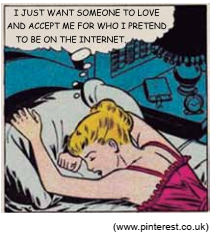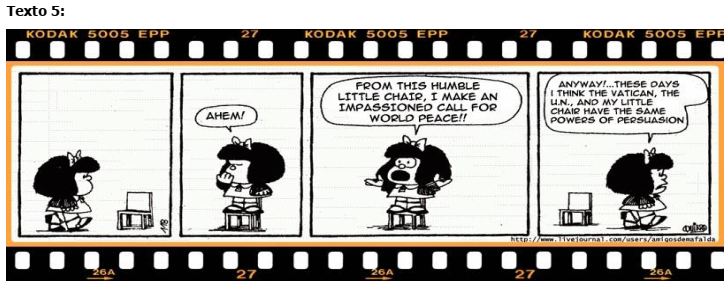Questões de Vestibular
Comentadas sobre interpretação de texto | reading comprehension em inglês
Foram encontradas 680 questões
people who believe that our planet is not round (l. 1-2)
The expression from the text which refers to this same group of people is:
The texts Sobreviveremos na Terra? and The flat Earth cruise: seriously, people? share one issue.
The issue mentioned in both texts is the following one:
Big Tech made the social media mess. It has to fix it
Analysis by David Goldman, CNN Business
Social media has given people a platform to spew hate speech and radical beliefs to other people, amplifying what are otherwise fringe opinions. A few have turned that hate into violence.
Silicon Valley has built the biggest, most powerful companies in the world. Now, tech leaders have a responsibility to rein in the creations that have grown too unwieldy for them to control.
These are businesses, and their leaders will have to And out how to do that without destroying their companies. So far, balancing Big Tech's responsibilities to society and its duties to investors has proven difficult.
A difficult balance
Facebook (FB) announced in July it would invest billions of dollars a year to improve safety and security on the platform. The company said the effort would come at the expense of user growth and profitability. The company's stock lost about a third of its value because investors were concerned about Facebook's growth stalling.
Twitter has largely rid ISIS recruiters from the social network. Facebook and YouTube have labeled fake news stories as such. Yet, the work isn't close to done. Google has also made significant changes to YouTube's advertising policies after ads from 300 companies and organizations ran on channels promoting hate groups.
"YouTube has strict policies that prohibit content which incites others to violence or promotes hatred," a YouTube spokesperson said. "We quickly remove videos violating our policies when flagged by our users."
What seemed to cross no one's mind a decade ago was the potential downside to building a platform with billions of customers. So many posts can't possibly be monitored in real time. The networks gave the dregs of society the ability to reach like-minded people and poison the minds of others.
Without that foresight, Silicon Valley allowed their creations to break down. They're not beyond repair, but fixing them will be costly and difficult. Whether Big Tech is up to the task will determine the fates of their platforms.
Available: https://edition.cnn.com/2018/10/29/tech/social-media- -hate-speech/index.html. Access: 30 may 2019. Adapted.
Glossary: spew: lançar; fringe: periféricas; to rein in: controlar; unwieldy: desordenado; duties: deveres; profitability, lucro;
stock: ação (no mercado); stalling: interrupção; flagged: sinalizados; dregs of society: pessoas inescrupulosas; like-minded: pessoas que compartilham ideias semelhantes; poison: envenenar;
foresight: visão; beyond repair: sem conserto; up to the task: à
altura da tarefa.
Big Tech made the social media mess. It has to fix it
Analysis by David Goldman, CNN Business
Social media has given people a platform to spew hate speech and radical beliefs to other people, amplifying what are otherwise fringe opinions. A few have turned that hate into violence.
Silicon Valley has built the biggest, most powerful companies in the world. Now, tech leaders have a responsibility to rein in the creations that have grown too unwieldy for them to control.
These are businesses, and their leaders will have to And out how to do that without destroying their companies. So far, balancing Big Tech's responsibilities to society and its duties to investors has proven difficult.
A difficult balance
Facebook (FB) announced in July it would invest billions of dollars a year to improve safety and security on the platform. The company said the effort would come at the expense of user growth and profitability. The company's stock lost about a third of its value because investors were concerned about Facebook's growth stalling.
Twitter has largely rid ISIS recruiters from the social network. Facebook and YouTube have labeled fake news stories as such. Yet, the work isn't close to done. Google has also made significant changes to YouTube's advertising policies after ads from 300 companies and organizations ran on channels promoting hate groups.
"YouTube has strict policies that prohibit content which incites others to violence or promotes hatred," a YouTube spokesperson said. "We quickly remove videos violating our policies when flagged by our users."
What seemed to cross no one's mind a decade ago was the potential downside to building a platform with billions of customers. So many posts can't possibly be monitored in real time. The networks gave the dregs of society the ability to reach like-minded people and poison the minds of others.
Without that foresight, Silicon Valley allowed their creations to break down. They're not beyond repair, but fixing them will be costly and difficult. Whether Big Tech is up to the task will determine the fates of their platforms.
Available: https://edition.cnn.com/2018/10/29/tech/social-media- -hate-speech/index.html. Access: 30 may 2019. Adapted.
Glossary: spew: lançar; fringe: periféricas; to rein in: controlar; unwieldy: desordenado; duties: deveres; profitability, lucro;
stock: ação (no mercado); stalling: interrupção; flagged: sinalizados; dregs of society: pessoas inescrupulosas; like-minded: pessoas que compartilham ideias semelhantes; poison: envenenar;
foresight: visão; beyond repair: sem conserto; up to the task: à
altura da tarefa.
Big Tech made the social media mess. It has to fix it
Analysis by David Goldman, CNN Business
Social media has given people a platform to spew hate speech and radical beliefs to other people, amplifying what are otherwise fringe opinions. A few have turned that hate into violence.
Silicon Valley has built the biggest, most powerful companies in the world. Now, tech leaders have a responsibility to rein in the creations that have grown too unwieldy for them to control.
These are businesses, and their leaders will have to And out how to do that without destroying their companies. So far, balancing Big Tech's responsibilities to society and its duties to investors has proven difficult.
A difficult balance
Facebook (FB) announced in July it would invest billions of dollars a year to improve safety and security on the platform. The company said the effort would come at the expense of user growth and profitability. The company's stock lost about a third of its value because investors were concerned about Facebook's growth stalling.
Twitter has largely rid ISIS recruiters from the social network. Facebook and YouTube have labeled fake news stories as such. Yet, the work isn't close to done. Google has also made significant changes to YouTube's advertising policies after ads from 300 companies and organizations ran on channels promoting hate groups.
"YouTube has strict policies that prohibit content which incites others to violence or promotes hatred," a YouTube spokesperson said. "We quickly remove videos violating our policies when flagged by our users."
What seemed to cross no one's mind a decade ago was the potential downside to building a platform with billions of customers. So many posts can't possibly be monitored in real time. The networks gave the dregs of society the ability to reach like-minded people and poison the minds of others.
Without that foresight, Silicon Valley allowed their creations to break down. They're not beyond repair, but fixing them will be costly and difficult. Whether Big Tech is up to the task will determine the fates of their platforms.
Available: https://edition.cnn.com/2018/10/29/tech/social-media- -hate-speech/index.html. Access: 30 may 2019. Adapted.
Glossary: spew: lançar; fringe: periféricas; to rein in: controlar; unwieldy: desordenado; duties: deveres; profitability, lucro;
stock: ação (no mercado); stalling: interrupção; flagged: sinalizados; dregs of society: pessoas inescrupulosas; like-minded: pessoas que compartilham ideias semelhantes; poison: envenenar;
foresight: visão; beyond repair: sem conserto; up to the task: à
altura da tarefa.
Big Tech made the social media mess. It has to fix it
Analysis by David Goldman, CNN Business
Social media has given people a platform to spew hate speech and radical beliefs to other people, amplifying what are otherwise fringe opinions. A few have turned that hate into violence.
Silicon Valley has built the biggest, most powerful companies in the world. Now, tech leaders have a responsibility to rein in the creations that have grown too unwieldy for them to control.
These are businesses, and their leaders will have to And out how to do that without destroying their companies. So far, balancing Big Tech's responsibilities to society and its duties to investors has proven difficult.
A difficult balance
Facebook (FB) announced in July it would invest billions of dollars a year to improve safety and security on the platform. The company said the effort would come at the expense of user growth and profitability. The company's stock lost about a third of its value because investors were concerned about Facebook's growth stalling.
Twitter has largely rid ISIS recruiters from the social network. Facebook and YouTube have labeled fake news stories as such. Yet, the work isn't close to done. Google has also made significant changes to YouTube's advertising policies after ads from 300 companies and organizations ran on channels promoting hate groups.
"YouTube has strict policies that prohibit content which incites others to violence or promotes hatred," a YouTube spokesperson said. "We quickly remove videos violating our policies when flagged by our users."
What seemed to cross no one's mind a decade ago was the potential downside to building a platform with billions of customers. So many posts can't possibly be monitored in real time. The networks gave the dregs of society the ability to reach like-minded people and poison the minds of others.
Without that foresight, Silicon Valley allowed their creations to break down. They're not beyond repair, but fixing them will be costly and difficult. Whether Big Tech is up to the task will determine the fates of their platforms.
Available: https://edition.cnn.com/2018/10/29/tech/social-media- -hate-speech/index.html. Access: 30 may 2019. Adapted.
Glossary: spew: lançar; fringe: periféricas; to rein in: controlar; unwieldy: desordenado; duties: deveres; profitability, lucro;
stock: ação (no mercado); stalling: interrupção; flagged: sinalizados; dregs of society: pessoas inescrupulosas; like-minded: pessoas que compartilham ideias semelhantes; poison: envenenar;
foresight: visão; beyond repair: sem conserto; up to the task: à
altura da tarefa.

Compared to the previous text “Why so few nurses are men”, the cartoon
Why so few nurses are men

Ask health professionals in any country what the biggest problem in their health-care system is and one of the most common answers is the shortage of nurses. In ageing rich countries, demand for nursing care is becoming increasingly insatiable. Britain’s National Health Service, for example, has 40,000-odd nurse vacancies. Poor countries struggle with the emigration of nurses for greener pastures. One obvious solution seems neglected: recruit more men. Typically, just 5-10% of nurses registered in a given country are men. Why so few?
Views of nursing as a “woman’s job” have deep roots. Florence Nightingale, who established the principles of modern nursing in the 1860s, insisted that men’s “hard and horny” hands were “not fitted to touch, bathe and dress wounded limbs”. In Britain the Royal College of Nursing, the profession’s union, did not even admit men as members until 1960. Some nursing schools in America started admitting men only in 1982, after a Supreme Court ruling forced them to. Senior nurse titles such as “sister” (a ward manager) and “matron” (which in some countries is used for men as well) do not help matters. Unsurprisingly, some older people do not even know that men can be nurses too. Male nurses often encounter patients who assume they are doctors.
Another problem is that beliefs about what a nursing job entails are often outdated – in ways that may be particularly off-putting for men. In films, nurses are commonly portrayed as the helpers of heroic male doctors. In fact, nurses do most of their work independently and are the first responders to patients in crisis. To dispel myths, nurse-recruitment campaigns display nursing as a professional job with career progression, specialisms like anaesthetics, cardiology or emergency care, and use for skills related to technology, innovation and leadership. However, attracting men without playing to gender stereotypes can be tricky. “Are you man enough to be a nurse?”, the slogan of an American campaign, was involved in controversy.
Nursing is not a career many boys aspire to, or are encouraged to consider. Only two-fifths of British parents say they would be proud if their son became a nurse. Because of all this, men who go into nursing are usually already closely familiar with the job. Some are following in the career footsteps of their mothers. Others decide that the job would suit them after they see a male nurse care for a relative or they themselves get care from a male nurse when hospitalised. Although many gender stereotypes about jobs and caring have crumbled, nursing has, so far, remained unaffected.
(www.economist.com, 22.08.2018. Adaptado.)
Why so few nurses are men

Ask health professionals in any country what the biggest problem in their health-care system is and one of the most common answers is the shortage of nurses. In ageing rich countries, demand for nursing care is becoming increasingly insatiable. Britain’s National Health Service, for example, has 40,000-odd nurse vacancies. Poor countries struggle with the emigration of nurses for greener pastures. One obvious solution seems neglected: recruit more men. Typically, just 5-10% of nurses registered in a given country are men. Why so few?
Views of nursing as a “woman’s job” have deep roots. Florence Nightingale, who established the principles of modern nursing in the 1860s, insisted that men’s “hard and horny” hands were “not fitted to touch, bathe and dress wounded limbs”. In Britain the Royal College of Nursing, the profession’s union, did not even admit men as members until 1960. Some nursing schools in America started admitting men only in 1982, after a Supreme Court ruling forced them to. Senior nurse titles such as “sister” (a ward manager) and “matron” (which in some countries is used for men as well) do not help matters. Unsurprisingly, some older people do not even know that men can be nurses too. Male nurses often encounter patients who assume they are doctors.
Another problem is that beliefs about what a nursing job entails are often outdated – in ways that may be particularly off-putting for men. In films, nurses are commonly portrayed as the helpers of heroic male doctors. In fact, nurses do most of their work independently and are the first responders to patients in crisis. To dispel myths, nurse-recruitment campaigns display nursing as a professional job with career progression, specialisms like anaesthetics, cardiology or emergency care, and use for skills related to technology, innovation and leadership. However, attracting men without playing to gender stereotypes can be tricky. “Are you man enough to be a nurse?”, the slogan of an American campaign, was involved in controversy.
Nursing is not a career many boys aspire to, or are encouraged to consider. Only two-fifths of British parents say they would be proud if their son became a nurse. Because of all this, men who go into nursing are usually already closely familiar with the job. Some are following in the career footsteps of their mothers. Others decide that the job would suit them after they see a male nurse care for a relative or they themselves get care from a male nurse when hospitalised. Although many gender stereotypes about jobs and caring have crumbled, nursing has, so far, remained unaffected.
(www.economist.com, 22.08.2018. Adaptado.)
Why so few nurses are men

Ask health professionals in any country what the biggest problem in their health-care system is and one of the most common answers is the shortage of nurses. In ageing rich countries, demand for nursing care is becoming increasingly insatiable. Britain’s National Health Service, for example, has 40,000-odd nurse vacancies. Poor countries struggle with the emigration of nurses for greener pastures. One obvious solution seems neglected: recruit more men. Typically, just 5-10% of nurses registered in a given country are men. Why so few?
Views of nursing as a “woman’s job” have deep roots. Florence Nightingale, who established the principles of modern nursing in the 1860s, insisted that men’s “hard and horny” hands were “not fitted to touch, bathe and dress wounded limbs”. In Britain the Royal College of Nursing, the profession’s union, did not even admit men as members until 1960. Some nursing schools in America started admitting men only in 1982, after a Supreme Court ruling forced them to. Senior nurse titles such as “sister” (a ward manager) and “matron” (which in some countries is used for men as well) do not help matters. Unsurprisingly, some older people do not even know that men can be nurses too. Male nurses often encounter patients who assume they are doctors.
Another problem is that beliefs about what a nursing job entails are often outdated – in ways that may be particularly off-putting for men. In films, nurses are commonly portrayed as the helpers of heroic male doctors. In fact, nurses do most of their work independently and are the first responders to patients in crisis. To dispel myths, nurse-recruitment campaigns display nursing as a professional job with career progression, specialisms like anaesthetics, cardiology or emergency care, and use for skills related to technology, innovation and leadership. However, attracting men without playing to gender stereotypes can be tricky. “Are you man enough to be a nurse?”, the slogan of an American campaign, was involved in controversy.
Nursing is not a career many boys aspire to, or are encouraged to consider. Only two-fifths of British parents say they would be proud if their son became a nurse. Because of all this, men who go into nursing are usually already closely familiar with the job. Some are following in the career footsteps of their mothers. Others decide that the job would suit them after they see a male nurse care for a relative or they themselves get care from a male nurse when hospitalised. Although many gender stereotypes about jobs and caring have crumbled, nursing has, so far, remained unaffected.
(www.economist.com, 22.08.2018. Adaptado.)
Why so few nurses are men

Ask health professionals in any country what the biggest problem in their health-care system is and one of the most common answers is the shortage of nurses. In ageing rich countries, demand for nursing care is becoming increasingly insatiable. Britain’s National Health Service, for example, has 40,000-odd nurse vacancies. Poor countries struggle with the emigration of nurses for greener pastures. One obvious solution seems neglected: recruit more men. Typically, just 5-10% of nurses registered in a given country are men. Why so few?
Views of nursing as a “woman’s job” have deep roots. Florence Nightingale, who established the principles of modern nursing in the 1860s, insisted that men’s “hard and horny” hands were “not fitted to touch, bathe and dress wounded limbs”. In Britain the Royal College of Nursing, the profession’s union, did not even admit men as members until 1960. Some nursing schools in America started admitting men only in 1982, after a Supreme Court ruling forced them to. Senior nurse titles such as “sister” (a ward manager) and “matron” (which in some countries is used for men as well) do not help matters. Unsurprisingly, some older people do not even know that men can be nurses too. Male nurses often encounter patients who assume they are doctors.
Another problem is that beliefs about what a nursing job entails are often outdated – in ways that may be particularly off-putting for men. In films, nurses are commonly portrayed as the helpers of heroic male doctors. In fact, nurses do most of their work independently and are the first responders to patients in crisis. To dispel myths, nurse-recruitment campaigns display nursing as a professional job with career progression, specialisms like anaesthetics, cardiology or emergency care, and use for skills related to technology, innovation and leadership. However, attracting men without playing to gender stereotypes can be tricky. “Are you man enough to be a nurse?”, the slogan of an American campaign, was involved in controversy.
Nursing is not a career many boys aspire to, or are encouraged to consider. Only two-fifths of British parents say they would be proud if their son became a nurse. Because of all this, men who go into nursing are usually already closely familiar with the job. Some are following in the career footsteps of their mothers. Others decide that the job would suit them after they see a male nurse care for a relative or they themselves get care from a male nurse when hospitalised. Although many gender stereotypes about jobs and caring have crumbled, nursing has, so far, remained unaffected.
(www.economist.com, 22.08.2018. Adaptado.)

The woman
Words that define the presente
At a time when the world is changing more quickly than ever before, we need a new vocabulary to help us grasp what’s happening.

Catfishing. This word would make more sense if it referred to fishing for cats, but in fact, it refers to people who construct false identities online. Whether out of boredom, loneliness or malice, they lure other people into continued messaging correspondence, thereby building false relationships with them (the apparent source of the term “catfish” is a 2010 documentary called Catfish, whose verity, ironically enough, has been questioned).
There are two ways of looking at this: 1) The internet/ cyberspace is wonderful, because it gives people the freedom to augment or totally change their identities, and this is a marvellous new dawn for human expression, a new step in human evolution. 2) Nah, it’s a false dawn, because the internet is essentially a libertarian arena, and, as such, an amoral one (lots of “freedoms” but with no attendant social obligations); it is a new jungle where we must watch our backs and struggle for survival, surely a backward step in evolution. I lean toward the latter.
(Cameron Laux. www.bbc.com, 08.08.2018. Adaptado.)
Words that define the presente
At a time when the world is changing more quickly than ever before, we need a new vocabulary to help us grasp what’s happening.

Catfishing. This word would make more sense if it referred to fishing for cats, but in fact, it refers to people who construct false identities online. Whether out of boredom, loneliness or malice, they lure other people into continued messaging correspondence, thereby building false relationships with them (the apparent source of the term “catfish” is a 2010 documentary called Catfish, whose verity, ironically enough, has been questioned).
There are two ways of looking at this: 1) The internet/ cyberspace is wonderful, because it gives people the freedom to augment or totally change their identities, and this is a marvellous new dawn for human expression, a new step in human evolution. 2) Nah, it’s a false dawn, because the internet is essentially a libertarian arena, and, as such, an amoral one (lots of “freedoms” but with no attendant social obligations); it is a new jungle where we must watch our backs and struggle for survival, surely a backward step in evolution. I lean toward the latter.
(Cameron Laux. www.bbc.com, 08.08.2018. Adaptado.)
Words that define the presente
At a time when the world is changing more quickly than ever before, we need a new vocabulary to help us grasp what’s happening.

Catfishing. This word would make more sense if it referred to fishing for cats, but in fact, it refers to people who construct false identities online. Whether out of boredom, loneliness or malice, they lure other people into continued messaging correspondence, thereby building false relationships with them (the apparent source of the term “catfish” is a 2010 documentary called Catfish, whose verity, ironically enough, has been questioned).
There are two ways of looking at this: 1) The internet/ cyberspace is wonderful, because it gives people the freedom to augment or totally change their identities, and this is a marvellous new dawn for human expression, a new step in human evolution. 2) Nah, it’s a false dawn, because the internet is essentially a libertarian arena, and, as such, an amoral one (lots of “freedoms” but with no attendant social obligations); it is a new jungle where we must watch our backs and struggle for survival, surely a backward step in evolution. I lean toward the latter.
(Cameron Laux. www.bbc.com, 08.08.2018. Adaptado.)
Words that define the presente
At a time when the world is changing more quickly than ever before, we need a new vocabulary to help us grasp what’s happening.

Catfishing. This word would make more sense if it referred to fishing for cats, but in fact, it refers to people who construct false identities online. Whether out of boredom, loneliness or malice, they lure other people into continued messaging correspondence, thereby building false relationships with them (the apparent source of the term “catfish” is a 2010 documentary called Catfish, whose verity, ironically enough, has been questioned).
There are two ways of looking at this: 1) The internet/ cyberspace is wonderful, because it gives people the freedom to augment or totally change their identities, and this is a marvellous new dawn for human expression, a new step in human evolution. 2) Nah, it’s a false dawn, because the internet is essentially a libertarian arena, and, as such, an amoral one (lots of “freedoms” but with no attendant social obligations); it is a new jungle where we must watch our backs and struggle for survival, surely a backward step in evolution. I lean toward the latter.
(Cameron Laux. www.bbc.com, 08.08.2018. Adaptado.)

Mafalda, personagem famosa por seu pensamento crítico, discute um tema de grande importância para o mundo.
Aponte a alternativa que melhor explica o contido na tirinha lida.
Texto 4:
Venezuelan official suggests migrant crisis is staged to undermine government
Diosdado Cabello implied that photos and news of refugees fleeing through South America on foot are fake as the UN warns the situation is nearing a ‘crisis moment’
Tom Phillips Latin America correspondent
Venezuela’s number two official has suggested his country’s escalating migration crisis – described by the United Nations as one of the worst in Latin American history – is being staged as part of a rightwing ruse to undermine his government.
Speaking at a congress of the ruling United Social party this week, Diosdado Cabello implied that images of Venezuelans fleeing through South America on foot had been manufactured. “It’s as if it was: ‘Lights, camera, action!’ It is a campaign against our country – a campaign of extraordinary dimensions,” Cabello added.
The UN estimates 2.3 million Venezuelans have fled since
2015 with Colombia expecting 2 million more to follow by
2020. That would mean 4.3 million people – 14% of
Venezuela’s population – had left. Last week, the UN’s
migration agency warned the mass migration is nearing a
“crisis moment” comparable to events involving refugees in
the Mediterranean. Many of those now heading into
neighbouring countries such as Brazil and Colombia are so
impoverished they do so on foot.

The UN estimates 2.3 million Venezuelans have fled since 2015 with Colombia expecting 2 million more to follow by 2020. Photograph: Evelin Rosas/EPA
On Tuesday, Venezuelan state media trumpeted the “repatriation” of 89 migrants who had reportedly been flown home from Peru free of charge after suffering exploitation abroad.
Disponível em https://www.theguardian.com/world/2018/aug/28/venezuela-diosdado-cabello-refugee-footage-fake. Acessado em 22/10/2018
O jornal The Guardian retrata um problema social vivido, sobretudo, em 2018, pelos venezuelanos. Com base no texto
lido, aponte a alternativa que retrata mais adequadamente a posição do governo da Venezuela sobre o assunto:

No TEXTO, Gandhi sugere que:

